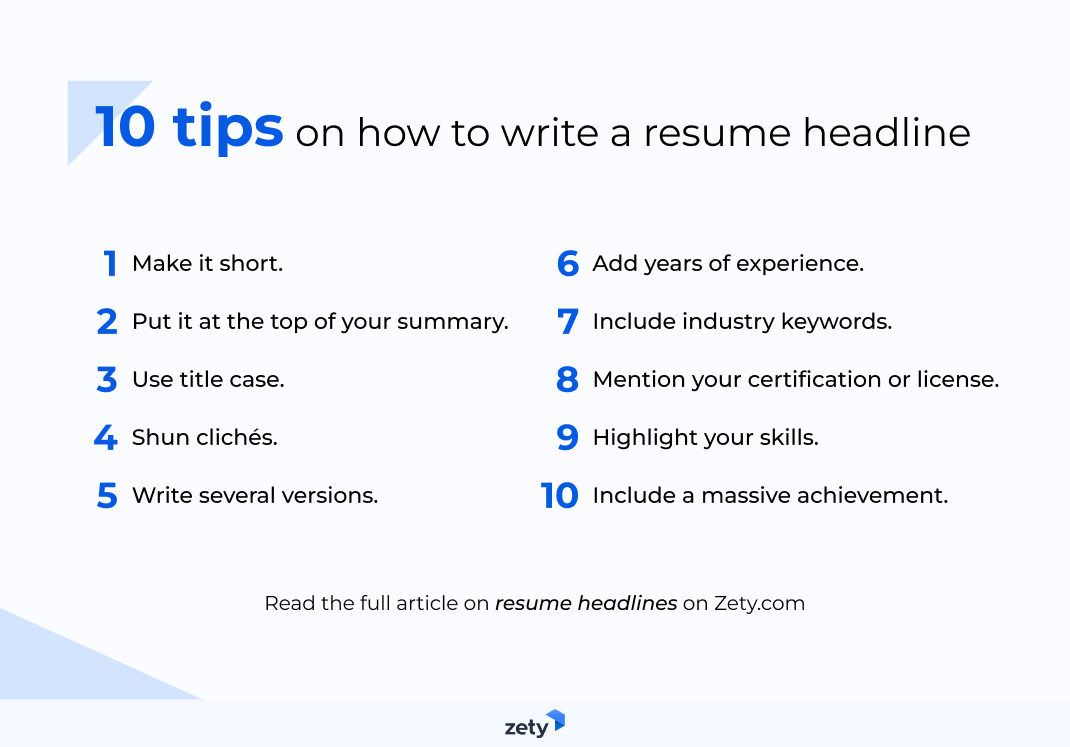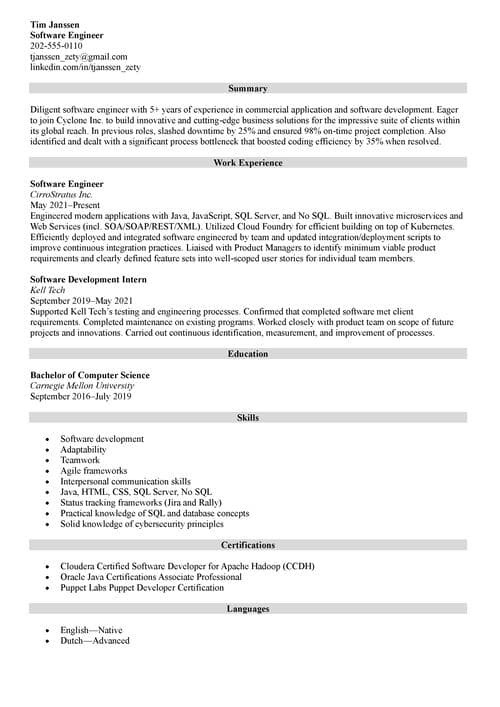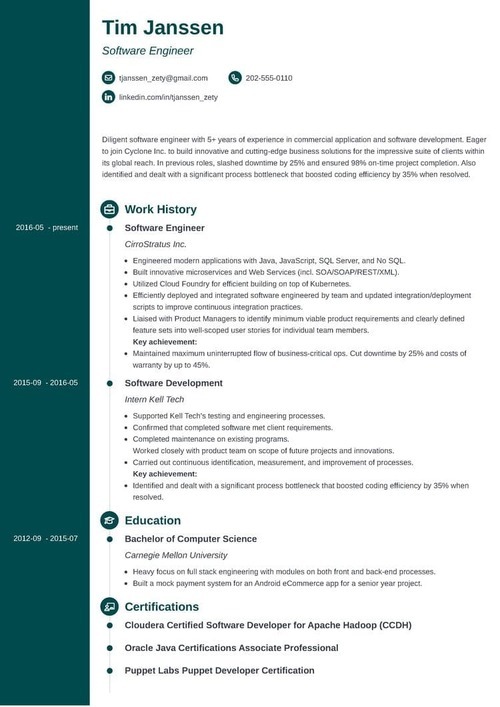What is a Good Headline for a Resume? 30+ Examples
Create Your Resume NowGood resume headlines are snappy one-liners that summarize the job seeker’s career.
Without a resume headline, the manager sees a big question mark as she reads your application. The best part? It’s easy to write a good headline for your resume once you know the steps.
This guide will show you:
- How to write a catchy resume headline that works.
- 30+ good resume headline examples for multiple jobs.
- 5 ways these headlines on resumes help your job search.
- A sample resume title shown in a full application.
Want to save time and have your resume ready in 5 minutes? Try our resume builder. It’s fast and easy to use. Plus, you’ll get ready-made content to add with one click. See 20+ resume templates and create your resume here.
Sample resume made with our builder—See more resume examples here.
After analyzing 11 million resumes created with our builder, we’ve gathered valuable insights from a diverse range of users across different industries and experience levels. Here are our top findings to help you create a more effective resume:
Data-Backed Insights From Actual Resumes
- 57.84% of resumes created in our builder exceed 300 words, 28.23% range between 101 and 300 words, and 5.35% are under 100 words.
- 3.59% of our users have no work experience, while 28.86% report having less than 3 years of work experience.
- The average number of skills listed on resumes is 12.56.
- The average number of jobs listed per resume is 2.61.
Looking for other ways to improve your application? See:
- How to Write a Resume Introduction? [+Intro Paragraph Samples]
- How to Write a Summary of Qualifications for a Resume
- How to Write a CV Personal Statement?
- How to Write a Resume Objective? [+Examples]
- How to Write a Professional Resume Summary? [+Examples]
- How to Make a Layout for Your Resume? [+Examples]
- Resume Sections & Categories [+Tips]
- How to Use Bullet Points on a Resume?
- How to Write a Targeted Resume? [+Examples]
- Resume Examples for Any Job
What Is a Headline on a Resume?
A resume headline, also known as a resume title, is a short sentence that highlights your experience and skills. The purpose of a headline for a resume is to make a first impression, catch the recruiter’s attention, and make them read on.
An example of a good headline for a resume is: Meticulous Software Developer Who Has Worked for Google. You’ll find more resume headline examples in the next chapter. But first, let’s see why you should even write a resume headline in the first place.
Why Write a Resume Headline?
There are several ways a headline for resumes can save you from the job search black hole:
- A resume headline instantly shows who you are and what makes you different from others.
- Putting a headline on your resume shows how the employer would benefit if they hired you.
- A resume title narrows your long work history down to a central theme. Especially in a two-page resume, walls of words can mystify potential employers.
- A good resume title feels like an elevator pitch.
- A headline for a resume perfectly sums up your professional strengths.
- It can help teleport your resume past the Applicant Tracking Software. Put the right keywords in your resume’s title to trigger hiring software to let you pass.
- A resume headline can show you’ve got the right job skills, especially if you’re writing a resume with no experience.
- A good resume headline can also highlight a massive achievement. Did you complete a Watson Fellowship? That’s not a bad fact for an entry-level headline.
Pro Tip: Name your resume file with your name + “resume”. Don’t just call it “resume” or “my resume.” That gets you lost in the flood of generic submissions.
Making a resume with our builder is incredibly simple. Follow our step-by-step guide, use ready-made content tailored to your job and have a resume ready in minutes.
When you’re done, Zety’s resume builder will score your resume and our ATS resume checker will tell you exactly how to make it better.
Resume Headline Examples and Ideas
Check out these general resume headline ideas you can take inspiration from when creating your resume.
Resume Headline Examples
- Resourceful Project Manager With 10 Years of Experience.
- Engaging High School Teacher Skilled in ESL and IEPs.
- Administrative Assistant With 2+ Years of Experience in Real Estate.
- Multi-Lingual Licensed RN With 5+ Years of Experience in Pediatrics.
- Hard-Working CNA and Nightingale Award Recipient.
- Personable Sales Representative Who Exceeds Sales Targets by 25%.
- Skilled Bartender With 4 Years of Experience in High-End Restaurants.
- Likable Manager and Winner of Management ABA.
- Diplomatic Receptionist With Deep Interpersonal Skills.
- Friendly Cashier and Gap 3X Employee of the Month.
- Sales Associate Who Attained a 42% Revenue Increase.
- Two-Time Shingo Prize-Winning Videographer.
- Graphic Designer With 6 Years in National Agencies.
- Business Analyst With 7 Years of DevOps Excellence.
- Time Out’s Server of the Year, Chicago, 2017.
- Mechanical Engineer With a 9-Year Track Record of Boosting Productivity.
- Digital Marketer Who Landed $30 Million in Sales.
- Certified Medical Assistant With a Strong Emergency Care Background.
- Insightful It Manager With a History of Beating Deadlines.
- Growth Marketing Manager With 5 Years in Sales.
- Enthusiastic Retail Clerk With 3+ Years’ Outdoor Outfitter Experience.
- Engaged Office Assistant With 4 Years of Experience in a Busy Shipping Firm.
- Executive Assistant with a Proven Track Record in Fortune 500 Companies.
- Creative Fashion Designer with a Portfolio of Award-Winning Collections.
- Charismatic Event Planner with 8 Years of Successful Corporate Events.
- Agile Scrum Master and Certified Agile Practitioner.
- Strategic HR Manager with a Focus on Employee Engagement.
- Accomplished Data Scientist with Proficiency in Machine Learning.
- Dynamic Public Relations Specialist with Crisis Management Expertise.
- Visionary Architect with a Portfolio of Iconic Commercial Buildings.
- Organized Supply Chain Manager with Expertise in Logistics Optimization.
- Dedicated Physical Therapist with a Focus on Sports Rehabilitation.
- Resourceful Nonprofit Fundraiser with a Track Record of Exceeding Goals.
Now that's something to include on your resume!
Those resume headline examples won’t let the hiring team forget you. They’re short, punchy, and memorable. They’re also packed with great info. The best are the shortest and least formula-driven.
We analyzed 11 million resumes made using our builder, to find the top 10 most commonly listed skills on resumes:
- Teamwork and Collaboration
- Problem-solving
- Excellent Communication
- Multitasking
- Attention to Detail
- MS Office
- Analytical and Critical Thinking
- Data Entry
- Project Management
- Team Management
How to Write a Resume Headline
How do you write a resume headline?
Slowly.
Stephen King spends “months and even years” writing opening sentences. “An opening line,” says King, “should say: Listen. Come in here. You want to know about this.”
Do that with the headline of your resume.
Here’s how to write a good resume headline:
- Make it short. You want the hiring team to remember your headline, so limit it to one phrase that catches their eye.
- Put it at the top of your summary. A resume headline belongs in the first line. (Under your name and contact info.)
- Write it in title case. Use all capitals like the headline of an article. Capitalize My Title has a great title case tool.
- Shun cliches. Don’t say you’re “highly skilled” or “very dependable.” Let your resume achievements speak for themselves.
- Write many. Create multiple headlines for each job you apply to. Use the same job title they list in the ad. The best way to do it is by writing down all your resume title ideas in one place and then choosing the best-fitting one.
- Add your years of experience—if relevant experience is a big plus for the job. (Save this for your summary if the headline for your resume is better without it).
- Use keywords. Does the job offer want an “RN” skilled in “emergency care” more than anything? Use those resume keywords for a boost.
- Mention your certification or license. If the job needs one of these, put it upfront in your resume headline.
- Highlight one or two of your skills. This is optional, but if the job wants one skill over all others (e.g., being bilingual), include it in your headline.
- Include massive achievement. Have you got a work accomplishment that drops jaws? Those go great in headlines for resumes. They're a great way to describe yourself on a resume.

Follow those steps and the resume headline examples above to increase your chances of landing your dream job.
Pro Tip: Can’t fit all ten tips in one phrase? Cut some. Use our tips as a guide, but the #1 rule is “make it short” for a reason.
Plus, a great cover letter that matches your resume will give you an advantage over other candidates. You can write it in our cover letter builder here. Here's what it may look like:
See more cover letter templates and start writing.
Key Takeaway
Summary of how to write a resume headline:
- A headline is a tagline that makes hiring teams remember you.
- Pack your resume headline with key points that show you’re the best choice.
- Keep your headline short—a single phrase—and punchy.
- Follow the resume headline examples above.
Have you got a great headline for your resume? We’d love to see it. Are you having a problem writing a resume headline you’re proud of? Give us a shout in the comments. We’d love to chat!
About Zety’s Editorial Process
This article has been reviewed by our editorial team to make sure it follows Zety's editorial guidelines. We’re committed to sharing our expertise and giving you trustworthy career advice tailored to your needs. High-quality content is what brings over 40 million readers to our site every year. But we don't stop there. Our team conducts original research to understand the job market better, and we pride ourselves on being quoted by top universities and prime media outlets from around the world.




